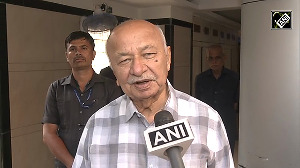The new findings, publicised after testing 57 samples of 11 soft drink brands of Coca Cola and PepsiCo collected from 25 manufacturing units across 12 states, claims that all the bottles examined were a "cocktail of 3-5 different pesticides" which was 24 times above the standards finalised by Bureau of Indian Standards.
"We have found pesticide residue in all soft drinks tested. Three years ago, when the tests were conducted we could spot only four pesticides. This time it has increased to five in some cases," Sunita Narain, director, CSE said.
The study - 'Soft Drinks - Hard Truth II' - claims that the average amount of pesticide residues found in all the samples was 11.85 parts per billion, which is 24 times higher than the BIS standards for pesticides in soft drinks (0.5 ppb).
In 2003, the average level of pesticide residues in Delhi samples were 34 times above the same BIS standards.
"This cannot be taken as a marginal reduction, because this time to our utter shock, we have found pesticides as high as 52 times in samples of Kolkata and 42 times in Nainital and Gorakhpur," said Chandrabhushan, associate director said.
Narain said the study has found that Pepsi Cola contained 30 times higher residues on an average and it was 27 times higher for Coca Cola.
It also found the presence of Lindane (a carcinogen), Chlorphyrifis (a neurotoxin), Heptachlor, Mealthion and HCH. Heptachlor, banned in India, was found in 71 per cent of the samples, at four times higher than BIS standards.
On an average, the levels of deadly Lindane were over 54 times above the approved standards while one Coca Cola sample from Kolkata had this pesticide 140 times. Chlorpyrifos levels were on an average 47 times higher and a Coca Cola sample from Thane tested for this particular pesticide at a level that is 200 times than the approved levels.
"This is clearly unacceptable as we know that pesticides are tiny toxins and impact our bodies over time. Our soft drinks remain unsafe and unhealthy and public health remains severly compromised," said Narain.
She said the fresh study was conducted by the same Pollution Monitoring Laboratory of CSE, which has conducted the 2003 tests after acquiring ISO 9001:2000 standards.
"This will silence the criticism raised by Cola companies that we are not competent enough to carry out such tests."
Meanwhile, the Indian Soft drink Manufacturers Association has said, "The soft drinks manufactured in India comply with stringent international norms and all applicable national regulations. Over the past three years, the soft drink industry has worked with the government of India (Ministry of Health and Bureau of Indian Standards), scientific community and NGO's to establish stringent science based norms."
"These efforts of the government, have led to establishment of stricter norms that are at par with the best in the world. We understand that the Ministry of Health is in the process of developing validated testing protocols to which all members of ISDMA are fully aligned and co-operating in the process," it added.






 © 2025
© 2025